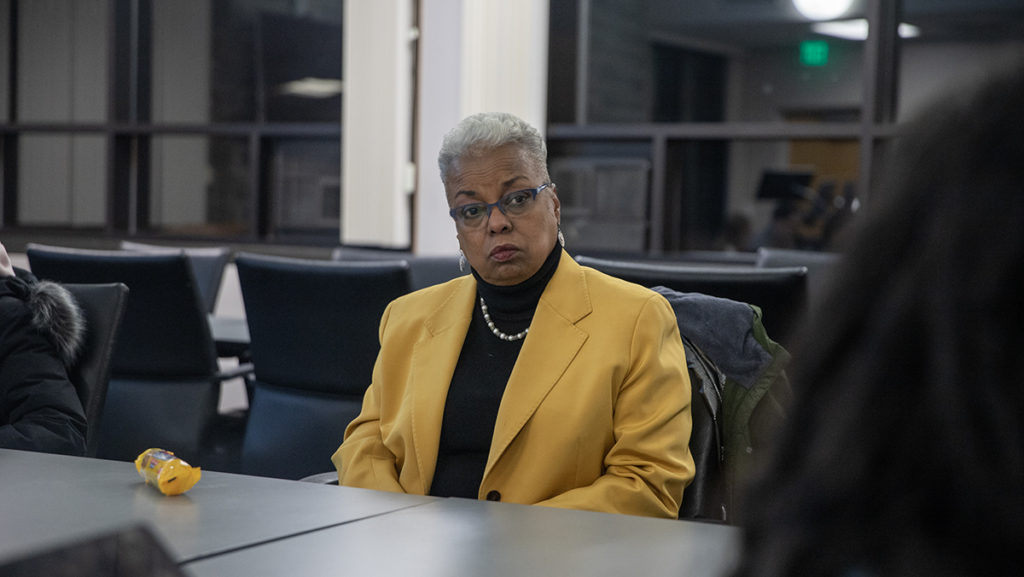The Student Governance Council held a meeting with Ithaca College President La Jerne Cornish to discuss recent events that have occurred on campus, including IC Rise Up’s written statements. The SGC also confirmed new senators and reported on senators’ activities before break.
The meeting began with a discussion about IC Rise Up’s printed statements hung across campus, which expressed concerns from students’ of color experiences of discrimination, othering and racism. Cornish paused for almost 30 seconds before discussing her perspective on the statements.
“It was hard to read, hard to see, hard to know that some of our students of color are experiencing these things on our campus,” Cornish said. “We need to acknowledge [that] these things have been experienced and then we need to have an honest conversation about what it means to be a student of color on our campus.”
IC Rise Up has decided to stay anonymous throughout voicing students’ experiences. Cornish said the issue with IC Rise Up’s anonymity is the lack of traditional and procedural confrontation with reporting incidents to the college.
“We reached out to IC Rise Up,” Cornish said. “They said they didn’t want to talk to us. We as a [President’s] Cabinet cannot address something if students are not willing to talk to us.”
First-year student Hannah Ahmed, Class of 2025 Senator, mentioned how this unwillingness to reach out to campus resources may come from students feeling uncomfortable and distrustful of the college’s ability to address students’ concerns.
“I agree with everything you’re saying,” Ahmed said to Cornish. “I think the only issue is that’s not communicated to students. That’s how you feel, but people from IC Rise Up don’t want to speak to you because they feel like conversations that have already been reported … haven’t seen any changes.”
Cornish said that, from her perspective, people just have not reported incidents.
“No one has come to me to have a conversation,” Cornish said. “I know what my cabinet does, I know how responsive we are. … People refuse to talk to us.”
Ahmed said that even if students feel comfortable reporting issues or incidents on campus, it is difficult because they may not know who to speak to. She said this could be another factor that contributes to students of color not feeling comfortable alerting the college of incidents.
“I was told to report to [the Office of Public Safety and Energy Management],” Ahmed said. “I didn’t know I was open to just coming to your office to report issues that have happened. … If I knew that, I would have done that.”
Campus police removed IC Rise Up’s printed statements the night of March 2 before allowing them to be hung up again March 3. Cornish addressed the confusion about why the statements were taken down in the first place. In the college’s Student Handbook, Section 2.12 Advertising and Solicitation policy explains that recognized on-campus groups can post on bulletin boards without approval. On-campus organizations must also identify their organization on advertisements and provide contact information.
“[OPS officers] were not directed to take them down, it was just procedure,” Cornish said. “Bonnie Prunty, Marsha [Dawson], talked to OPS and we said we would leave them up. … People felt like they were being silenced because they were being taken down. … We didn’t want to silence students.”
First-year student Lili Chalfant, School of Communications senator, and Ahmed said to Cornish that to improve communication with the student body, the college should consider a college-wide public announcement. Cornish said the college has done this before but should continue to be something rarely used.
“I struggle with thinking that we need to make a public announcement about everything that happens on this campus,” Cornish said. “There are some incidents that rise to the occasion of needing a public response, and some do not.”
Addressing IC Rise Up for the final time, Cornish said IC Rise Up, despite not getting permission to hang the statements throughout the college, is still protesting properly and effectively. Cornish said these issues are being assessed.
“It’s a peaceful protest,” Cornish said. “No complaints there. I took pictures to document what was said … to see when and how we’re going to make progress on some of the issues. … I don’t want it to disappear. I don’t want students to think we didn’t read or that it’s not captured. It’s captured.”
In an effort to expand student resources and comfortability, Cornish announced that a Focused Listening Session would happen March 8. The goal of the event was to hear and understand the concerns being voiced by IC Rise Up’s printed statements.
Sophomore Tatyana Rubio ran for senator-at-large and the Appropriations Committee. Rubio has served on the boards of many clubs, including the Bureau of Concerts, Sister 2 Sister and PODER: Latinx Student Association. Her platform focuses on improving college-wide mental health, expanding food options, expanding private study options and providing better transportation.
“I would love to be a voice for my fellow peers,” Rubio said. “I will not stop talking, especially if I feel strongly about something.”
Senior Connor Watson, who was unable to attend the meeting in person, also ran for the Appropriations Committee. Watson was formerly assistant to the vice president of business and finance, resigning last semester alongside senior Maxwell Powers, who re-joined the board as senator-at-large on Feb. 6. Senate Chair senior Austin Ruffino read Watson’s message.
“I would like to return to be supportive and help the committee in my last few weeks as an IC student,” Watson wrote in an email to the SGC.
Rubio and Watson were both approved for their respective roles in a vote of 7–0–1.
During senator reports, first-year student Rishabh Sen, vice president of campus affairs, discussed the newly renovated bathroom in Terrace 10. Sen said that renovating this bathroom, as well as other bathrooms on campus, has been a project that has slowly expanded over the past few years.
“The goal is to make [bathrooms] more gender-neutral,” Sen said. “It’s being made better, more private and altogether improved.”
Finally, Ruffino reminded the board that spring elections for the SGC are coming up. Every member of the SGC must be reelected for their position. Five of the 10 board members are seniors, meaning some positions will be vacant.
“I would really love it if you would all stay in SGC,” Ruffino said. “You are all doing a really, really, really good job.”
The SGC is the sole representative body for the Ithaca College student community. The SGC can be contacted at [email protected].









